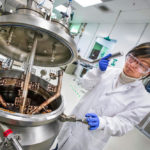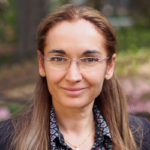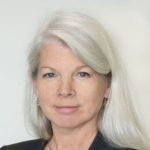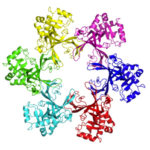Through the second round of the U.S. Department of Energy (DOE) Small Business Vouchers Pilot, eight small businesses have been awarded vouchers, totaling $1.1 million, to work with Berkeley Lab to bring their next-generation clean energy to the marketplace faster. The vouchers pay for expertise and use of facilities that help small businesses advance their technologies toward commercialization. Several Biosciences partnerships were established: Mango Materials and Zymochem bioenergy projects were awarded vouchers to work with the Advanced Biofuels Process Demonstration Unit (ABPDU). Also, a Heliobiosys project will be performed using the capabilities of both the ABPDU and Sandia National Laboratories. The Lab was chosen by the DOE as one of five national laboratories to lead the pilot and was named a lead lab in the Advanced Manufacturing, Fuel Cells, Geothermal and Vehicle technology areas.
PNAS Profile on Nogales Accompanies Inaugural Article
Eva Nogales’ life and research work was highlighted in the PNAS Profile of August 12. The profile, written in recognition of her election to the National Academy of Sciences in 2015, accompanied the PNAS Inaugural Article of Nogales, a faculty structural biologist in the Molecular Biophysics & Integrated Bioimaging Division. In this article, titled “Near-atomic cryo-EM structure of PRC1 bound to the microtubule,” she uses cryo-EM to visualize, at a near-atomic level, how an essential component of the mitotic spindle maintains critical contact with microtubules to aid cell division.
Maxon Presents to Cellular Agriculture Pioneers
On July 14, Biosciences Principal Deputy Mary Maxon participated in the invitation-only Cellular Agriculture Innovators’ Workshop of New Harvest, a non-profit research institute with the mission of building and establishing the field of cellular agriculture. Maxon presented on public-private partnerships and pre-competitive collaborations for the advancement of the field, specifically looking at government programs that could assist in moving it forward.
The Golden Time to Do Hybrid Methodologies
The work of Eva Nogales and Jennifer Doudna, Molecular Biophysics & Integrated Bioimaging Division faculty scientists, were highlighted in the August 18 Nature technology feature article, “Let the structural symphony begin,” a discussion of the current “golden time to do hybrid methodologies,” according to Nogales. Structural biologists, such as Nogales who was interviewed for this article, now have “the tools to tackle important questions about cells’ molecular machinery that would have been impossible to answer just a few years ago.” Combining these imaging methods – selecting from an impressive suite of different imaging techniques – is an increasingly popular approach in the field of structural biology, in which X-ray crystallography has been the premier method for more than a century. According to the article, while “the most powerful insights come from (these) hybrid methodologies that integrate images from several different tools, ” it also has its drawbacks. Read the full article here.
Fleming Honored by Japanese Chemical Society
Graham R. Fleming, senior scientist in the Molecular Biophysics & Integrated Bioimaging Division, has been named an Honorary Member of the Chemical Society of Japan (CSJ). The award will be presented at the 97th CSJ Annual Meeting in March 2017. Fleming will join a select group of only fourteen living honorary members, five of whom are Nobel Laureates. The society was founded in 1878. With its current membership exceeding 34,000, it is one of the most affluent academic societies in Japan, covering most areas of pure and applied chemistry.
- « Previous Page
- 1
- …
- 176
- 177
- 178
- 179
- 180
- …
- 213
- Next Page »
Was this page useful?








